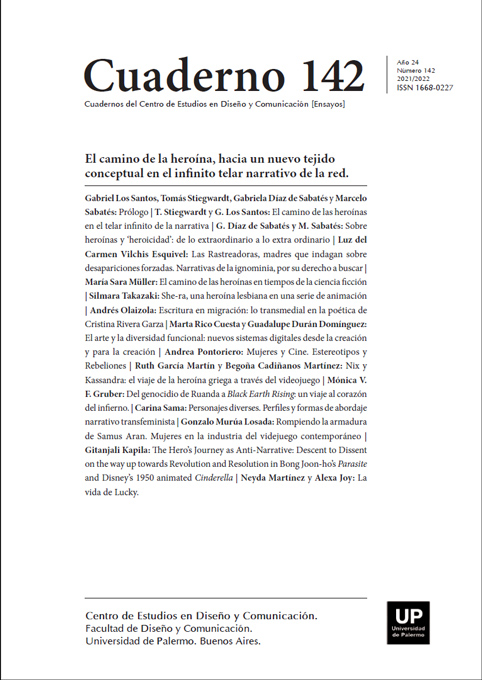Sobre heroínas y ‘heroicidad’: De lo extraordinario a lo extra-ordinario
Abstract
Campbell's structuralist analysis of the common traits that, mainly in literature, the path of the hero must possess, has been criticized for being biased, and generated alternatives that are more inclusive. In this work we propose an even more radical revision not so much of the concept of "hero" but of the notion of "heroicity". We begin with an idea less based on literature and more on real life of what is understood as a folk/pre-theoretical conception of the heroic, analyzing it based on the Wittgenstenian notion of "family resemblance". The outcome is an inclusive concept that resists the heroic as something extraordinary and frames it in that which is added (extra) to the ordinary to be admirable.
References
Allende, Isabel (1990). Cuentos de Eva Luna. Plaza y Janes.
Bidaseca, Karina (2018). “Etnografías feministas posheroicas. La lengua subalterna subversiva de las etnógrafas del Sur”. Pléyade (2018). Vol. 21(1). ISSN: 0719-3696.
Bruner, Jerome (1990). Acts of meaning. Cambride, MA: Harvard University Press.
Borges, Jorge Luis (1974). Obras Completas. Emecé.
Campbell, Joseph (1949). The Hero with A Thousand Faces. Pantheon Books.
Delgado Bernal, Dolores (2006). Learning and living pedagogies of the home: The mestiza consciousness of Chicana students. In Delgado Bernal, Elenes, Godinez & Villenas (Eds.). Chicana/Latina education in everyday life: Feminista perspectives on pedagogy and epistemology (pp. 77-80). Albany: State University of New York Press.
Díaz de Sabatés, Gabriela (2018). “The Role of Latinx Fathers in Their Daughters’ College Success: Shifting Cultural Paradigms?” (with Taylor, Kay Ann). Journal of Latinos and Education, Taylor & Francis Online.
Díaz de Sabatés, Gabriela (2019). “Gender, activism and social change: Reframing the modern heroine”, Cuadernos del Centro de Estudios de Diseño y Comunicación, vol. 91, pp. 199-209.
Gargallo, Francesca (2013). Las ideas feministas latinoamericanas. UACM publishers.
Gil, Rosa María, & Inoa Vásquez, Carmen (1996). The María paradox: How Latinas can merge old world traditions with new world self-esteem. New York: Berkley.Gracia, Jorge (1999). Hispanic / Latino Identity: A Philosophical Perspective. Willey- Blackwell.
Murdock, Maureen (1990). The Heroine’s Journey. Woman’s Quest for Wholeness, Shambhala.
Sabatés, Marcelo (2020). “On Heroines and the Ethics of Revenge: Emma Zunz and Borges’ Metaphilosophy”, Cuadernos del Centro de Estudios de Diseño y Comunicación, vol. 117, pp. 249-258.
Steiff, Joseph. (2019) “To Lose my Mind and Find my Soul. The Masculine and Femenine in Films Set in the Forest”, Cuadernos del Centro de Estudios de Diseño y Comunicación, vol. 91, pp. 249-258.
Wittgenstein, Lutwig (1992), Investigaciones Filosóficas, UNAM, Editorial Crítica.
Los autores/as que publiquen en esta revista ceden los derechos de autor y de publicación a "Cuadernos del Centro de Estudios de Diseño y Comunicación", Aceptando el registro de su trabajo bajo una licencia de atribución de Creative Commons, que permite a terceros utilizar lo publicado siempre que de el crédito pertinente a los autores y a esta revista.


